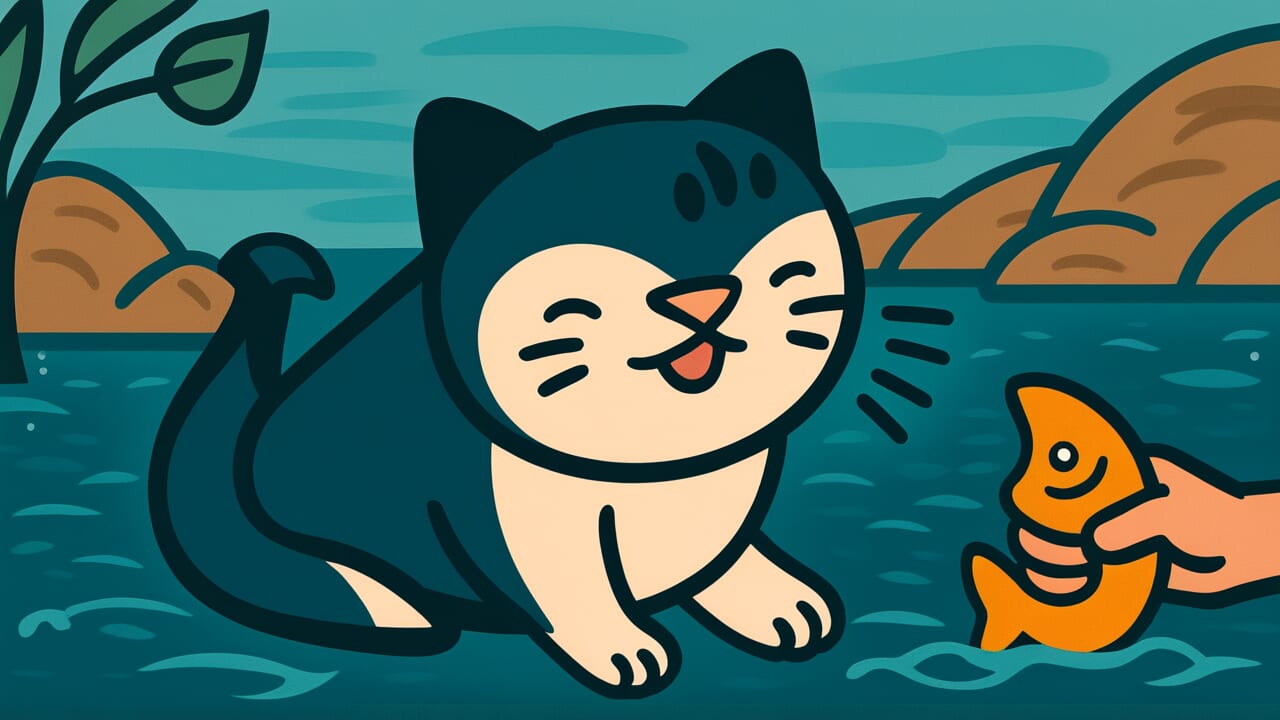How to Read “A cat declining fish”
Neko no uo jitai
Meaning of “A cat declining fish”
This proverb describes someone who truly wants something deep down but pretends to refuse it out of politeness. It also suggests that such forced restraint cannot last long.
A cat declining fish in front of it is completely unnatural behavior. The expression shows just how forced and unrealistic such restraint really is.
People use this proverb when someone clearly wants something but refuses it because of social expectations or appearances.
Even today, we use it when there’s a gap between true feelings and outward behavior. For example, someone who desperately wants a promotion might say humbly, “That’s too much responsibility for me.”
Or someone might politely refuse something they really want by saying, “No, no, I’m fine.” This proverb reflects a clear-eyed observation that such forced restraint will eventually break down.
Origin and Etymology
The exact first appearance of this proverb in literature is unclear. However, we can make interesting observations from how the phrase is constructed.
The combination of cats and fish holds deep symbolic meaning in Japanese culture.
Cats loving fish has been known since ancient times. This appears frequently in Edo period woodblock prints and literature.
Cats waiting in front of fish shops or targeting fish in kitchens were familiar everyday scenes for common people. Fish represented what cats desired most.
The expression of a cat “declining” fish contains strong irony and insight. Refusing something you instinctively crave is a powerful concept.
This likely projects human social customs of restraint and formality onto a cat.
Japanese society has long valued the virtue of hiding true feelings and showing restraint. However, people knew from experience that restraint against instinct has limits.
Just as cats cannot resist fish, humans cannot maintain restraint when facing what they truly want. This proverb captures that sharp observation of human nature.
Interesting Facts
The image of cats loving fish is uniquely Japanese and not universal worldwide. As an island nation, Japan had abundant fish that frequently appeared on dinner tables.
Cats naturally had many opportunities to eat fish. In Western countries, cats are traditionally seen as hunters of mice and birds. Their connection to fish is not as strong as in Japan.
Interestingly, nutritionally speaking, feeding cats only fish is not actually appropriate. Eating large amounts of certain fish continuously can cause vitamin B1 deficiency.
The fact that what we instinctively crave is not always good for us may overlap with this proverb’s lesson.
Usage Examples
- He’s aiming for the CEO position but acts humble like “A cat declining fish”
- She said no to cake because she’s dieting but ate it anyway—truly “A cat declining fish”
Universal Wisdom
This proverb has been passed down because it sharply points out a fundamental human contradiction. As social beings, we constantly waver between true feelings and outward appearances.
Desire is a natural human emotion. Wanting something and wishing to obtain it is proof of being alive.
Yet we also live among others and need social behaviors like restraint and humility. Between these two demands, people sometimes make unnatural choices.
The cleverness of this proverb lies in using a cat as the example. Cats are creatures faithful to their instincts.
By presenting the impossible scenario of a cat declining fish, the proverb highlights how unnatural forced restraint truly is.
The deeper insight is that such restraint cannot last. Humans can make rational decisions, but we also have emotions and desires.
Continuing behavior that contradicts our true feelings places great strain on our hearts. Eventually that tension reaches its limit and true feelings emerge.
Our ancestors understood this human nature through long observation.
This proverb warns against false modesty while also containing warm understanding of human weakness.
When AI Hears This
When we quantify a cat declining fish, we see the core of behavioral economics. Imagine a cat faces two choices: “fish to eat now” or “double the fish if you wait 30 minutes.”
According to prospect theory, living creatures react more than twice as sensitively to losses than gains. The act of “declining fish” registers in the cat’s brain as an intense sense of “losing immediate benefit.”
Here’s where hyperbolic discounting becomes interesting. Both humans and cats tend to choose 10,000 yen today over 1 million yen in a year.
The discount rate drops not linearly but in a sharp curve over time. Research shows rewards one week away feel about 70 percent of present value, and one month away drops below 50 percent.
A cat can decline fish only when “future loss imagery” exceeds “present benefit.” For example, if severely scolded for eating fish before, the brain instantly calculates “fear of scolding” as predicted loss.
This dramatically discounts the value of the fish in front of it. This is the same mechanism as humans “resisting desired cake”—the loss image of future health risks outweighs present pleasure.
Lessons for Today
This proverb teaches us living today the importance of being honest with our true feelings. Of course, we cannot simply demand everything we want.
However, forced restraint and excessive modesty not only hurt ourselves but also create distortions in relationships with others.
Modern society especially increases opportunities to worry about others’ opinions through social media. Hiding true feelings can easily become a habit.
Yet regarding truly important things and what we genuinely desire, we should have courage to express them appropriately.
At the same time, this proverb encourages understanding toward others. When someone refuses out of restraint, we need compassion to sense their true feelings.
If someone is doing “A cat declining fish,” rather than forcing them to endure, we can rephrase our offer in a more acceptable way.
Listen to your own heart’s voice. And regarding truly important things, be someone who can honestly say “I want this.”
That is not selfishness but the first step toward living authentically.



Comments